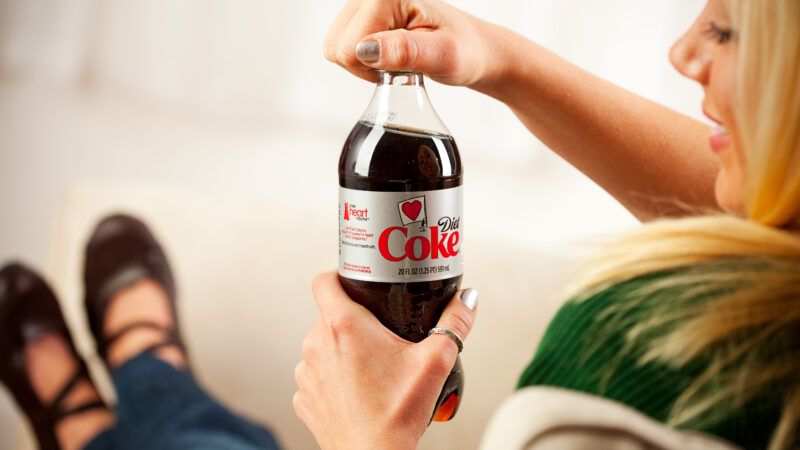Diet Coke Isn't Going To Give You Cancer
Despite a World Health Organization report that says artificial sweetener aspartame is maybe, possibly, carcinogenic.

Aspartame is one of the world's most widely consumed artificial sweeteners, found in diet sodas like Diet Coke, sugar-free ice creams, cereals, and yogurts. According to a new report released by the International Agency for Research on Cancer (IARC), a body of the World Health Organization, aspartame could maybe, possibly, also be a hazard for cancer.
But before anyone panics about whether their favorite sugar-free treat will give them cancer, it's essential to understand what the IARC does and doesn't do.
The IARC examines products and activities that may represent a cancer hazard and places them in one of four groups depending on the strength of the evidence they examine. Group 1 is carcinogenic to humans and includes cigarettes—but also hot dogs. Group 2a is probably carcinogenic and includes red meat and night shift work. Group 2b is possibly carcinogenic, and Group 3 is not classifiable.
The IARC placed aspartame in Group 2b, meaning there's weak evidence, and they can't say for sure whether there is, in fact, any cancer hazard. For context, pickled vegetables and aloe vera are also in Group 2b. The IARC examines cancer hazards even if they're extremely unlikely. It doesn't examine risk, which is what truly matters to consumers when making their everyday choices.
Determinations about the actual level of risk faced by consumers are made by the WHO's Joint Expert Committee on Food Additives (JECFA). In conjunction with the IARC's report, the JECFA also released its verdict on aspartame. Examining all the evidence on aspartame's risks, not just cancer-related ones, the JECFA concluded there was no reason to change its stance on what counts as an acceptable daily intake at 40 milligrams per kilogram.
The average American male weighs 197.9 pounds, this translates to an acceptable daily intake of 3,588 mg of aspartame, meaning it would take around 18 diet sodas a day to surpass the JECFA's guidelines. Even the heaviest consumers of diet drinks come nowhere close to meeting this threshold. These guidelines are also significantly below any dosage linked to possible harm in animal studies.
The Food and Drug Administration, infamous for its caution and risk aversion, approved aspartame in 1972. It continues to say aspartame is safe, setting its limit for acceptable intake slightly higher than the JECFA's at 50 mg per kilogram. The FDA is unhappy with how the WHO has gone about its review of aspartame, writing to the body last year that a dual review released by two different bodies taking two different approaches could cause public confusion. "In our opinion, JECFA is better suited to assess any risk associated with the consumption of aspartame because it considers all relevant toxicological endpoints, including carcinogenicity," said the FDA.
Given the FDA's record on public health communications over the past few years, the agency is throwing stones from glass houses, but the point is sound. The JECFA reviews public and private data on all aspects of aspartame's risks and has found no reason to change its position. The FDA agrees, reiterating that "aspartame being labeled by the IARC as 'possibly carcinogenic to humans' does not mean that aspartame is actually linked to cancer."
The IARC came to its conclusion mainly because of observational studies suggesting a link between aspartame and liver cancer. While observational studies can prove helpful in identifying correlations, they cannot determine causation and often have selection biases in terms of the participants. Both the FDA and JECFA had access to the same data as the IARC but decided the evidence was too weak to change their stances on aspartame.
"These IARC reports are getting a bit farcical," said David Spiegelhalter, a statistics professor at the University of Cambridge. "In spite of IARC's conclusion that aspartame was 'possibly carcinogenic to humans', which got lots of media attention, another expert committee (JECFA) that actually investigates the magnitude of any risk found 'no convincing evidence from experimental animal or human data that aspartame has adverse effects.'"
Aspartame is claimed to be the most studied food additive on Earth. While further research on the food and drink we consume is always welcome, it can't be ignored that the IARC's pronouncements frequently confuse the public and can provide fodder for opportunistic lawyers and politicians to present themselves as guardians of public health by attacking products that are, for all intents and purposes, safe.
Drink your Diet Coke without fear.


Show Comments (69)